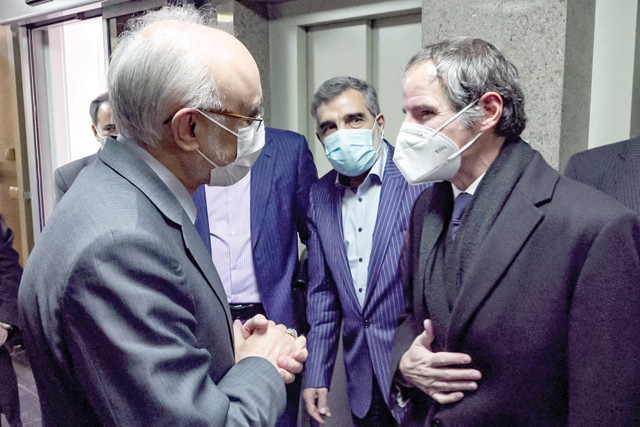TEHRAN — Iran said Tuesday it had started to restrict some site inspections by the UN nuclear watchdog in response to the US refusal so far to lift sanctions imposed by former president Donald Trump.
Interim arrangements agreed at talks Sunday in Tehran meant the International Atomic Energy Agency would not be "flying blind" while "political discussions" on restoring a 2015 deal between Tehran and major powers go ahead, IAEA director Rafael Grossi has said.
But while praising Grossi's 11th-hour diplomacy, Washington called on Tehran to "fully meet its verification and other nuclear non-proliferation commitments" under the deal while talks were under way.
The changes to the IAEA's monitoring and inspection regime, which were ordered by Iran's conservative-dominated parliament last year, are the latest in a series of retaliatory measures Iran has adopted in response to Trump's 2018 withdrawal from the agreement.
“The implementation of the law began this morning,” Iran’s Foreign Minister Mohammad Javad Zarif told the official IRNA news agency.
Recordings from monitoring equipment the IAEA installed at Iran’s nuclear sites to verify its compliance will now be withheld by Tehran until US President Joe Biden has lifted the crippling sanctions imposed by Trump.
So-called “voluntary transparency measures”, including snap inspections of sites not under regular monitoring — are also suspended.
Zarif said the changes would have no major immediate impact on the work of the IAEA inspectors.
“The crux of this deal is that the data recorded on our nuclear programme... will be stored and not handed over to the IAEA,” Iran’s top diplomat said.
The data “had never been supplied to the IAEA in real time but had been handed over on a daily or weekly basis”, he said.
If talks on a US return to the nuclear deal drag on, that will change, however.
Data deadline
The Iranian Atomic Energy Organisation has said that under the new law, if there is still no lifting of US sanctions after three months, it would start erasing the recordings.
If the sanctions were not “fully lifted in the next three months”, the data would be “destroyed for good”, it said.
Biden has signalled readiness to revive the nuclear deal but insists Iran first return to all its nuclear commitments.
The Biden administration has said it is willing to join EU-led talks with Iran in search of a compromise.
Iran’s supreme leader said on Monday that the Islamic republic could boost uranium enrichment to 60 per cent if needed.
“We will act to the point that is needed and the country requires,” Ayatollah Ali Khamenei said, adding that “we could bring enrichment to 60 per cent” for nuclear propellants and other purposes.
That would far surpass the 3.67 per cent limit Iran had accepted under the 2015 deal, but still be short of the 90 per cent or so required for an atomic bomb.
“The Islamic republic will not back down on the nuclear issue and will strongly continue down the path of what the country requires for today and tomorrow,” Khamenei said in remarks posted on his official website.
He stressed the United States was the party that had left the deal and emphasised Iran’s suspension of its commitments was “still reversible” if Washington returns to its own commitments.
